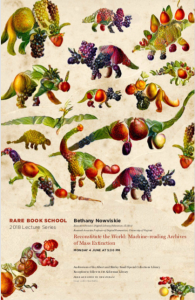[The following is the text of a talk I gave (with changes) as “Reconstitute the World: Machine-Reading Archives of Mass Extinction,” in two different contexts last week. First, I opened the summer lecture series at the University of Virginia’s Rare Book School, where I’m privileged to be a faculty member and supporter. Next, I closed the first week of the 2018 Digital Humanities Summer Institute (DHSI) at the University of Victoria and opened a Digital Library Federation (DLF) unconference on social justice and digital libraries, DLFxDHSI. I started my UVic talk by noting that we met on the unceded, traditional territory of the Lkwungen-speaking peoples of that part of the Pacific Northwest, and I therefore acknowledged the Songhees and Esquimalt, and also the WSÁNEĆ peoples who are among the First Nations with historical and enduring relationships to that land. I note this here, because the talk I gave is relevant, I think, to the need for humility, respect, and reparation and to the celebration of endurance and renewal (or, better, reclamation) that such statements, still uncommon in the United States, suggest.]
This is a talk on digital stewardship and heritage futures at a strange confluence. Now, I’m more used to saying “cultural heritage”—cultural heritage futures—and I will certainly be addressing those today: possibilities for the strongly future-oriented digital stewardship of human expression as we encounter it in transitory, embodied performances, as intangible culture, and of course in ways that leave more lasting, material traces. But I use the broader phrase “heritage futures” deliberately, because this is a talk that moves me beyond my training and my various cultural comfort zones in two big ways.
First, I’ll step out of the humanities to gesture at projects in preservation, access, and scientific analysis that address our broader, global heritage of biodiversity. That’s a heritage we share with all living things. And where we’ve failed in stewarding living environments, I think it’s fair to say that we’ve only moderately well succeeded in documenting them—which in this case are two radically different things. Our success is particularly mixed—though improving—in documenting them with an eye toward the activist, artistic, or reflective work we may soon wish to do in radically changed ecosystems.
Read the full post here.
